Section 3: LITHUANIA TODAY
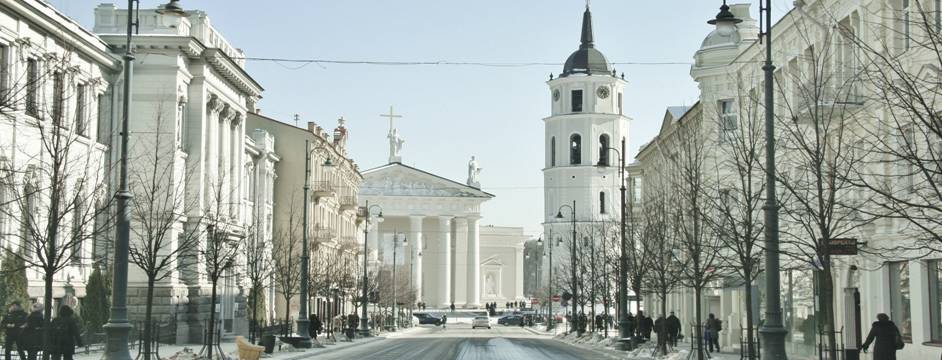

THE VOICE OF INTERNATIONAL LITHUANIA
|
VilNews has its own Google archive! Type a word in the above search box to find any article.
You can also follow us on Facebook. We have two different pages. Click to open and join.
|
Sat, 24th November, 2012 - (0) Comment
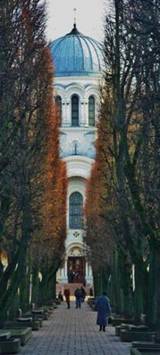 |
KAUNAS IN FOCUS Kaunas, Lithuania's second largest city and former capital, is receiving much attention in VilNews now as 2012 is coming to an end. We focus on history, business, culture, innovation, tourism and more. We would also like to hear from you who have you personal Kaunas... Send us your Kaunas story! |
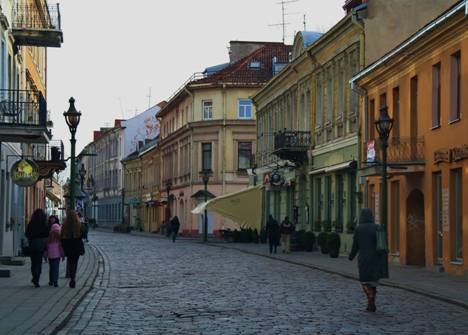
Vilniaus gatve (above), the Kaunas Old Town’s main street, was back in
the 13th century a highway linking the city with Vilnius.
Text and photos: Aage Myhre
It was in 1408 that Lithuania’s Grand Duke Vytautas the Great granted Magdeburg rights to Kaunas, and after that point in time this settlement at the confluence of the Neris and Nemunas rivers began to grow as an important centre and main port for Lithuanian trade with Western Europe.
The original settlement, where today’s Kaunas old town is located, was first mentioned by the chroniclers in 1361, and it was here in the old town the first brick castle was built by the end of the 14th century, to defend Kaunas from the Crusaders’ attacks.
Sat, 24th November, 2012 - (0) Comment

After Vilnius was occupied by the Russian Bolsheviks in 1919, the government of the Republic of Lithuania established its main base in Kaunas. Later, when the capital Vilnius was forcibly annexed by Poland, Kaunas became the temporary capital of Lithuania,a position it held until 28 October 1939, when the Red Army handed Vilnius back to Lithuania. Here a picture from the Presidential Palace of the Republic of Lithuania in Kaunas, around 1930
At the end of World War I the Germans allowed the Vilnius Conference (18–22 September 1917) to convene (elections for a formal representative assembly were not permitted), demanding that Lithuanians declare loyalty to Germany and agree to an annexation. The Conference instead announced basic principles of a limited in territorial scope, but independent ethnic Lithuanian state, with cultural rights for the minorities; accordingly, the publication of the Conference's resolution was not allowed. The Conference elected a 20-member Council of Lithuania (Taryba) and empowered it to act as the executive authority of the Lithuanian people. The Council declared on 11 December Lithuanian independence as a German protectorate, and then adopted the outright Act of Independence of Lithuania on 16 February 1918. It proclaimed Lithuania as an independent republic, organized according to democratic principles.
Sat, 24th November, 2012 - (0) Comment
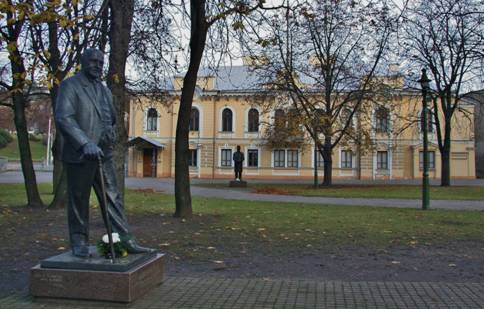
Statutes of the three interwar presidents are placed in the park in front of the Historical Presidential Palace in Kaunas. Picture: Statues of Aleksandras Stulginskis (front) and Antanas Smetona.
Photo: Aage Myhre
After Lithuania re-won its freedom in 1918, a Polish military invasion led to an annexation of eastern Lithuania (including the capital city Vilnius) to Poland. This was never recognized and Lithuania remained at a state of war with Poland, with the new government city Kaunas officially designated the “Temporary capital”. “We won’t calm down without Vilnius” became a popular slogan and organizations like the “Union for the Liberation of Vilnius” sprung up with the Lithuanian-Polish territorial dispute becoming one of the keystones of interwar Lithuania’s policy.
Sat, 24th November, 2012 - (0) Comment
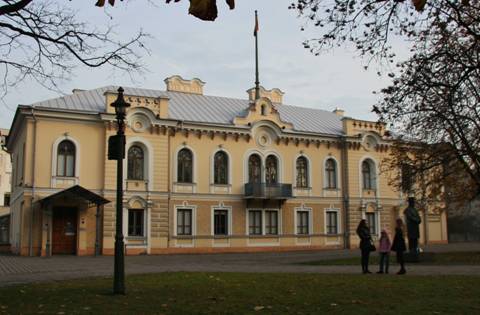
Read more about the Palace at http://www.istorineprezidentura.lt/?lang=en
Photo: Aage Myhre
The Historical Presidential Palace in Kaunas is a must-see place for everyone, whether native-born or a visitor to Lithuania. It is one of the most important memorials of the Republic of Lithuania in 1918–1940.
Visitors are offered an introduction into the evolution of modern Lithuanian statehood, the opportunity to feel the pulse of a growing city that suddenly faced the challenge of becoming a capital and rapidly changed from a fortress into a modern city.
The building was at the centre of major political events of the time. It housed the President’s meetings with the Cabinet, as well as numerous meetings with the representatives of foreign countries, military, clergy and various organizations. It was a fundamental landmark of Foreign Policy; emissaries of foreign states here offered their credentials to the President of the Lithuanian Republic. The building also witnessed the Coup d’état of 1926, a crisis of parlamentarism and a turn towards authoritarian regime. In the face of imminent Soviet occupation, the Last Meeting of the government of the independent Lithuania took place here on the night from June 14 to 15 of 1940.
Fri, 23rd November, 2012 - (2) Comment
Former President Valdas Adamkus:
Hiding in the woods near Kaunas
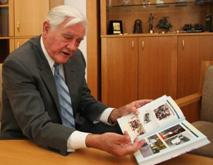 "I thank my friend Gabrielius Žemkalnis, brother of Vytautas Landsbergis, that I’m still alive. In the years of World War II, he and I joined the resistance movement for Lithuania's independence, together with Leo Grinius, by publishing and circulating the underground, anti-Nazi newspaper “Jaunime, budek!” (Youth, Be on Guard!) in Kaunas.
"I thank my friend Gabrielius Žemkalnis, brother of Vytautas Landsbergis, that I’m still alive. In the years of World War II, he and I joined the resistance movement for Lithuania's independence, together with Leo Grinius, by publishing and circulating the underground, anti-Nazi newspaper “Jaunime, budek!” (Youth, Be on Guard!) in Kaunas.
One day, in 1944, I was suddenly visited by Žemkalnis' sister. She said her brother had been arrested by the Gestapo, but that he had managed to whisper my name to her as he was led out of the apartment. She immediately understood that it was something he and I had together that I had to be warned about. I was still only 17 years old, but realized that this could be extremely serious, so I ran to the woods and hid there for a long time.
Read more...
Professor Irena Veisaite:
Escaping from the Kaunas ghetto
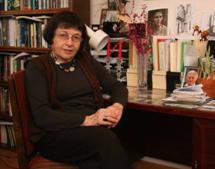 In August 1941 all the Kaunas Jews were imprisoned in the ghetto which was located in the Kaunas suburb Vilijampole. Irena stayed in the ghetto with her grandparents and one aunt. The 7th of November 1943 is a date Irena will never forget. Lithuanian friends of her parents, the Strimaitis family, had managed to convey a message to her in the ghetto, saying that she should follow one of the labour brigades out of the ghetto to the work place in town. They also had procured false documents for her. An agreement was reached with a Jewish policeman who was responsible for the list of workers that she should not be included on the list that day, but still follow the group out and then try to escape unnoticed into a side street as soon as they passed the ghetto gates. The moment of stepping out of the column of Jewish workers was the most horrifying and dangerous one in young Irena's life. But fortunately she made it without being detected. Read more...
In August 1941 all the Kaunas Jews were imprisoned in the ghetto which was located in the Kaunas suburb Vilijampole. Irena stayed in the ghetto with her grandparents and one aunt. The 7th of November 1943 is a date Irena will never forget. Lithuanian friends of her parents, the Strimaitis family, had managed to convey a message to her in the ghetto, saying that she should follow one of the labour brigades out of the ghetto to the work place in town. They also had procured false documents for her. An agreement was reached with a Jewish policeman who was responsible for the list of workers that she should not be included on the list that day, but still follow the group out and then try to escape unnoticed into a side street as soon as they passed the ghetto gates. The moment of stepping out of the column of Jewish workers was the most horrifying and dangerous one in young Irena's life. But fortunately she made it without being detected. Read more...
Attorney Regina Narusiene:
Hiding behind a blue Kaunas curtain
 “I was almost five years old, but I still clearly remember the day when a truck with Soviet soldiers drove up to our home in Kaunas. My father ordered me to hide behind the blue curtains in the home’s living room and not make even the smallest move or sound. Our family was to be deported to Siberia and the soldiers had come to take us. It felt as though it took an eternity before my father returned and told me I could come out from my hiding place. A truck with German soldiers had come up behind the Soviet truck, forcing the Soviets to leave. That probably saved our lives. As the Soviets were returning to Lithuania in 1944 we escaped to Germany, and after living in Displaced Persons camp for 5 years, in 1949 we emigrated to the United States.” Read more...
“I was almost five years old, but I still clearly remember the day when a truck with Soviet soldiers drove up to our home in Kaunas. My father ordered me to hide behind the blue curtains in the home’s living room and not make even the smallest move or sound. Our family was to be deported to Siberia and the soldiers had come to take us. It felt as though it took an eternity before my father returned and told me I could come out from my hiding place. A truck with German soldiers had come up behind the Soviet truck, forcing the Soviets to leave. That probably saved our lives. As the Soviets were returning to Lithuania in 1944 we escaped to Germany, and after living in Displaced Persons camp for 5 years, in 1949 we emigrated to the United States.” Read more...
Dr. Jonas Sliupas:
Declining the presidency (1926)
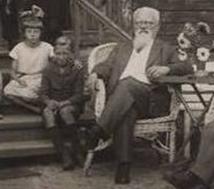 The year is 1926. It is a very dark late autumn evening in Kaunas, Lithuania's capital between 1st and 2nd World Wars, when three officers from the Lithuanian army rush up to the house where Dr. Jonas Sliupas now lives while he teaches at the University of Kaunas. It is nearly midnight when the officers knock heavily on his door and asks to come inside. The officers bring shocking news. They tell that since the early autumn of 1926 key officers within two army groups have been in full swing of planning a coup d’état in Lithuania, and that they have now reached the point that they want to depose of President Kazys Grinius and insert a new President. The question to Dr. Sliupas is therefore whether he can accept becoming the country's new President.
The year is 1926. It is a very dark late autumn evening in Kaunas, Lithuania's capital between 1st and 2nd World Wars, when three officers from the Lithuanian army rush up to the house where Dr. Jonas Sliupas now lives while he teaches at the University of Kaunas. It is nearly midnight when the officers knock heavily on his door and asks to come inside. The officers bring shocking news. They tell that since the early autumn of 1926 key officers within two army groups have been in full swing of planning a coup d’état in Lithuania, and that they have now reached the point that they want to depose of President Kazys Grinius and insert a new President. The question to Dr. Sliupas is therefore whether he can accept becoming the country's new President.
But Dr. Sliupas is not willing to accept. Read more...
Sat, 17th November, 2012 - (0) Comment
 |
New parliament sworn in Lithuania's new Seimas (parliament), elected last month, assembled for its first sitting on Friday 16 November. Read more… |
 |
The President did not show up All previous presidents always personally welcomed new deputies of the Seimas at their first session. Read more… |
 |
But the ex-President did Former Lithuanian President Valdas Adamkus says he is hopeful about the country's new Seimas. Read more… |
 |
Court adjourns hearing Vilnius Regional Court was this week scheduled to hear the Labour Party's fraudulent bookkeeping case, but… Read more… |
 |
New parliament speaker? Lithuania's Labour Party will propose Vydas Gedvilas for the post of parliamentary speaker. Read more… |
 |
President not yet ready President Dalia Grybauskaitė not yet ready to nominate Social Democratic Algirdas Butkevičius as new PM. Read more… |
 |
Uspaskich to leave Brussels The Labour Party's leader has decided to give up his mandate as a member of the European Parliament. Read more… |
 |
Polish party to head energy? Leader of the Electoral Action of Poles, Valdemar Tomaševski, remains secretive. Read more… |
Fri, 9th November, 2012 - (6) Comment
By Aage Myhre, Editor-in-Chief
Lithuania has powerful neighbours, as the overwhelming majority of the world's countries with AAA credit rating are located in Scandinavia and Western Europe. These countries, however, are successful in many different ways, not least with regard to social welfare, health care, education, rule of law, transparency, press freedom and a very good balance between government, business, education, science, and more.
The table below tells an interesting story about the relationship between these qualities for a group of nations that lead in world development. These tremendous success stories is something Lithuania should try to learn from.
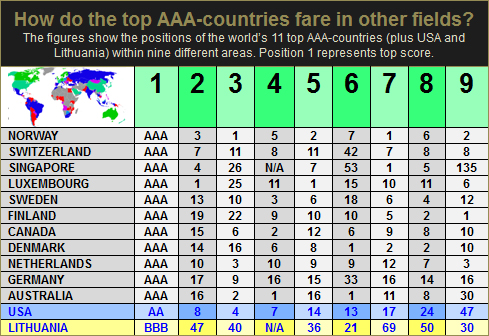
1. Credit rating, Standard & Poor’s
2. GDP (PPP) per capita
3. Human Development Index (HDI), UN
4. Best country to live in, OECD
5. Social welfare
6. Education
7. Rule of Law
8. Corruption, Transparency International
9. Press freedom
Fri, 9th November, 2012 - (1) Comment
By Aage Myhre
I believe many of our readers have heard about or even studied the so-called Triple Helix model that emphasizes the need of cooperation and interaction between science, industry and government. I believe this is an extremely interesting model also for a Nordic-Baltic cooperation, as it describes an intensification of a process and a shortening of the time span between discovery and utilization, and increased reliance of industry on knowledge originated in academic institutions.
As knowledge becomes an increasingly more important part of innovation, the university (science and education) as a knowledge-producing and disseminating institution plays a larger role in business innovation. In earlier times, innovation was an activity formerly and largely performed by the industry or government, or depending upon the social system, a bilateral interaction between these two institutional spheres. In a knowledge-based economy, however, the university becomes a key element of the innovation system both as human capital provider and seedbed for new firms. The three institutional spheres (public, private, and academic) – that formerly operated at arms’ length – are increasingly interwoven with a spiral pattern of linkages emerging at various stages of the innovation and industrial policy-making process.
Wed, 7th November, 2012 - (6) Comment
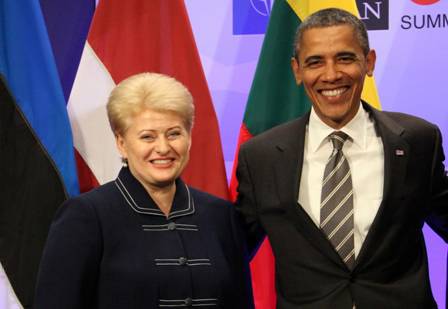
In 2010, Lithuanian President Dalia Grybauskaitė openly disagreed with
Obama on a new arms reduction plan, claiming it harmed Lithuanian
security, and in a rather shocking move refused to take part in
a dinner with Obama in Prague. Grybauskaitė was the only
invited president who refused to meet with Obama.
In April 2010, Barack Obama and his Russian counterpart Dmitry Medvedev signed a new arms reduction treaty in Prague, primarily with regards to the Eastern European missile defense system that had been planned by the George W. Bush administration.
After the signing, President Obama invited the presidents of Lithuania, Latvia, Estonia, and Romania, as well as the prime ministers of Poland, Czech Republic, Bulgaria, Croatia, Hungary, Slovakia and Slovenia to attend a dinner with him in Prague.
Lithuanian President Dalia Grybauskaitė openly disagreed with Obama on the new reduction plan, claiming it harmed Lithuanian security, and in a rather shocking move refused to take part in the dinner in Prague. Grybauskaitė was the only invited president who refused to meet with Obama.
Wed, 7th November, 2012 - (4) Comment
U.S. re-elected president enjoys great confidence around the world. Let us hope that this confidence can contribute to less tension and increased human understanding between peoples and nations over the four years that are now ahead of us.
If the world outside USA had a say, President Barack Obama would have won with very clear margins over Mitt Romney, according to surveys presented in several world news media ahead of the U.S. elections. See below.
Unfortunately, there are no numbers available for Lithuania.
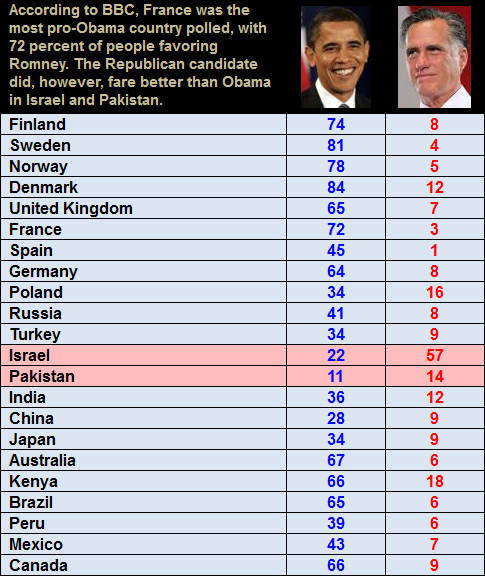
Read more at:
http://www.bbc.co.uk/news/world-us-canada-20008687
http://rt.com/politics/obama-romney-election-us-russia-putin-576/
http://www.jpost.com/DiplomacyAndPolitics/Article.aspx?id=289600
http://www.aftenposten.no/nyheter/uriks/usavalg/Verden-ville-valgt-Obama-7037530.html
World reactions to Obama’s reelection
From Australia, to China, Egypt and Russia ... hear people say "Obama" in different accents ... and watch some of them offer their more in-depth assessment of his second presidential election win
Viewpoints from around the world on Barack Obama's US election triumph, in which the incumbent democrat president held off the challenge from Republican rival Mitt Romney. The reaction was generally positive on the streets of Moscow, Beijing and Tokyo - though more mixed in countries such as Iraq and Egypt.
Mon, 29th October, 2012 - (0) Comment

The leaders of three opposition parties agreed to form a ruling coalition following a meeting at one of Vilnius hotels after the Seimas election results emerged yesterday. The Social Democrats will nominate the prime minister. The announcement was made by Algirdas Butkevičius, leader of the Social Democratic Party of Lithuania, Viktor Uspaskich, leader of the Labour Party, and Rolandas Paksas, leader of the
Order and Justice Party.
Photo: Irmantas Gelūnas/15 min
Leaders of Lithuania's three opposition parties agreed to form a ruling coalition following a meeting at one of Vilnius hotels after the Seimas election results emerged. The Social Democrats will nominate the prime minister.
The announcement was made by Algirdas Butkevičius, leader of the Social Democratic Party of Lithuania, Viktor Uspaskich, leader of the Labour Party, and Rolandas Paksas, leader of the Order and Justice Party.
"We have agreed to form a three-party coalition. We have agreed that a representative of the Social Democratic Party will be the prime minister. We have agreed to start drafting a government programme. A working group will be set up by the three parties, and we'll start reviewing the next year's draft budget next week," Butkevičius said.
Mon, 29th October, 2012 - (5) Comment
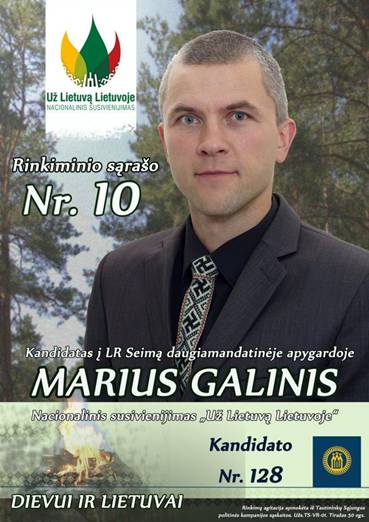
As a relief to many liberal-minded people and human rights activists came the news that Lithuanian voters completely trashed ultra-nationalist parties. The National Alliance “For Lithuania in Lithuania” (whatever that means) tried its best to mobilize the most primitive ethnic hatred, although even a classical antisemitic cartoon they distributed was about economy (the incumbent government's work in returning religious property of Jewish communities, that was nationalized under the Soviet rule). PHOTO: Marius Galinis of the „Union For Lithuania in Lithuania.“ (Lithuanian „Nacionalinis susivienijimas ‘Už Lietuvą Lietuvoje’“)
By Daiva Repečkaitė
The complicated electoral system in Lithuania makes general elections an exciting show. After the first round, when multi-constituency votes were counted, the victory of the populist Labor Party looked clear. However, after the second round (half of the Members of the Parliament are elected in single-seat constituencies), voters brought the traditional rivals, the Social Democrats and the Conservatives, ahead of the populist party. Despite the initial panic and hasty criticism of the election outcomes as a victory of populist and pro-Russian forces, the election brought unprecedented gain to traditional parties and strengthened the forces with consistent ideologies. It is also time to understand that economy in Lithuania comes before relations with Russia.
Sat, 27th October, 2012 - (2) Comment
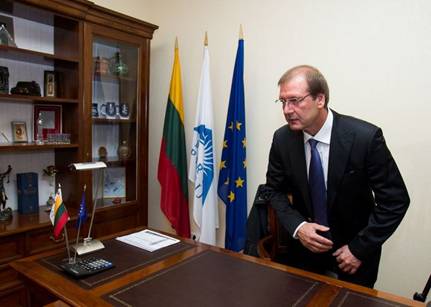
Photo: Irmantas Gelūnas/15 min
Less than ten years have passed since Lithuanian media seriously started to tell us about Viktor Uspaskich, the Russian who moved to Lithuania in the late 1980s to work as a welder, later becoming a successful businessman and politician. We learned about a businessman who paid wages to his employees as cash in envelopes, we heard that he was Gazprom's long arm into Lithuania and that big dollar amounts were smuggled from Moscow via Riga to Lithuania to bribe institutions and voters to help build up the political party he was in the process of establishing, a party which in 2004 led him right to the top in that year's parliamentary elections.
We heard that he was a Russian spy with the special task of undermining the Lithuanian economy and its advancing toward association with the EU and NATO, and that the 'cucumber firm' he had established in the small town Kėdainiai west of Kaunas was only a cover for his much bigger escapades in sales of Russian natural gas to Europe and helping to create more Russian influence on political decision-making in Lithuania and later also in the EU.
Viktor Uspaskich succeeded in establishing his Labour party in 2003 and became a strong force in the 2004 government of PM Algirdas Brazauskas. According to reports, Uspaskich, proposed that Brazauskas should keep the prime minister's seat in return for allowing Uspaskich, to become deputy prime minister. Brazauskas rejected the informal bid, saying he did not want "to be a tool in Uspaskich's hands and assume responsibility for mistakes made by the new administration."
In 2006 this government split and Mr Uspaskich himself disappeared to Russia. This followed leaks that prosecutors were investigating several lurid claims, notably that the party was taking kickbacks from European Union grants, that it had breached campaign-finance limits in the 2004 election and that it had taken money from Russia. Mr Uspaskich said he was not responsible for book-keeping, and that the attacks on his party were purely political.
In 2007 Uspaskich returned to Lithuania and, in 2008, he was again elected to parliament , however stripped of the immunity he had acquired. The European Parliament later did the same thing, which Uspaskich labeled as undemocratic.
In 2009 Mr. Uspaskich was elected to the European Parliament whereupon Lithuanian authorities asked the EU Parliament to waive his parliamentary immunity. This was refused, leading to a sharp exchange of words between MEP Vytautas Landsbergis and the European Parliament’s Sir Graham Watson as late as in 2011.
Then this year's election comes, and Uspaskich is again on top in spite of all the accusations, investigations and turbulence he has been in the centre of for almost 10 years now. President Dalia Grybauskaite reportedly does not want to name the Russian businessman as prime minister and he, it is said, does not especially yearn for the position because he wouldn’t have time for his businesses. In addition, as noted by the most famous Lithuanian political commentator, Rimvydas Valatka, no prime minister in Lithuania has ever gained popularity while in office – rather the opposite. “And he [Uspaskich] needs to start playing various games, so that he could play the savior,” Valatka said, asserting that a coalition of social democrats (former communists) will play the role of those who will do unpopular things.
A look at the country’s demographics suggests a possible explanation for why Uspaskich won. For the past 15 years almost one million people, especially the young and enterprising, have left the country. The older ones who remain would prefer to vote for Uspaskich or someone else who promised them security. The pre-election debate, therefore, revolved around a hike in the minimum wage.
Then, just before the second round of the 2012 election, it becomes known that Lithuania's Prosecutor General's Officer has charged the Labour Party, its leader Viktor Uspaskich, Labour MP Vytautas Gapšys, candidate in the ongoing Seimas elections Vitalija Vonzutaitė, as well as the party's former accountant Marina Liutkevičienė with fraud in the party's fraudulent bookkeeping case.
The prosecutor said that the Labour Party's financial documentation for the 2004-2006 period failed to include about LTL 25 million (EUR 7.3 million) in income and about LTL 23 million in spending related to property, commitments, and structural changes. The party also allegedly failed to pay taxes of around LTL 4 million.
Uspaskich is facing up to 8 years in prison. He strongly denies all charges.
What is the truth and who exactly is this man?
Mon, 22nd October, 2012 - (1) Comment
 Time to
Time to By Aage Myhre, Editor-in-Chief
I asked this question in my editorial last week, referring to the massive migration that takes place from Lithuania these days. We talk no longer about emigration, but about evacuation.
I also ventured to express some criticism on how this country has been ruled for the past 22 years, as it is my conviction that the mass exodus is due to these years’ mismanagement and inadequate facilitation for new jobs, new investments and new businesses.
I forgot, by the way, mentioning rule of law and system critical press as key ingredients for a country that wants progress. In these two areas Lithuania is still an undeveloped nation.
I used myself as an example. That was perhaps a mistake. What I wanted to convey was that foreigners who have come here to work or develop business do not feel particularly welcome. I also wanted to say that the same largely applies to the country’s own population, not least to all those who are now 'fleeing' from here, looking for a new and better country to live in.
Let me also stress that I myself will never leave Lithuania as such. A prominent Lithuanian-American once asked me why I do so much for Lithuania, although I do not have my roots here. My response was that 'I have my branches here, and branches are as important as roots'. I obviously was referring to my two children, who I hope one day will feel real pride being 50% Lithuanian. Because the downturn of this country will not continue forever. One day the negative trend will reverse.
Let me also state that VilNews will continue and increasingly evolve as an important link between Lithuanians and their homeland. More and more people are reading VilNews, more and more writing for us or contributing in other ways.
I think such a common communication platform will prove important in the 'reconstruction' of Lithuania as a nation, and of 'all Lithuanian' as a common, strong bond between all of us with Lithuania in our hearts.
Click HERE to read my last week editorial…
-------------------------------------------------------------------------------------------------
Here a few of the comments we have received:
 Gaila Mucen, Australia |
Maybe the Government will listen and start doing something when even westerners who wanted to build a thriving Lithuania start leaving Your thoughts reflect the sentiments of other foreigners who came to Lithuania with big expectations of what a great country it could be but the situation today is a far cry from these expectations. Read more… |
 Lars M. Hansen, Denmark/ Lithuania |
Our love and hate relation to the lovely place called Lithuania Very well described, the love and hate relation to the lovely place called Lithuania. With so many opportunities and still with such grim prospects of the future. I say STAY. And not let the negative, departing nor disillusioned part of population decide which way their country will go… Read more… |
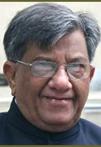 Rajinder Chaudhary, India/Lithuania |
Let us sail together and if at all sink – then sink together Aage, Most of all feel much the same way for our dear Lithuania as we all came here not only to do something for ourselves but for this country too. I can say with confidence that things have improved but the impact is hardly felt. The Outflow of the young manpower who are the future of this country is a very worrying factor… Read more… |
 Kestutis Eidukonis, Arizona/Lithuania |
What this country needs is a Leader who believes in Lithuania It is always darkest before the storm. Being close to the problems is difficult. But we cannot give up! We cannot be quitters. The fight must go on. Lithuanian partisans gave their lives for their country, countless thousands of Lithuanians suffered in Gulags. Others suffered the loss of their country for years. The "Soviet" apparatus is very good… Read more… |
 Irene Simanavicius, Toronto, Canada |
If you wanted to create a ruckus or take a stand, then moving to Lithuania was probably not your best choice Moving to a foreign country is one of the biggest life transitions you can ever make. While it can be challenging and fraught with paperwork, it can also be an immensely rewarding and enriching experience. Whether the move is for business purposes or for personal reasons. Read more… |
Mon, 22nd October, 2012 - (0) Comment

|
Trust me, we
|
By Nellie Vin, Florida
I am one who left Lithuania in 1996 after we got independence in 1990. In few years the country’s economists, with Landsbergis as the head on top, crushed all too fast (with privatization) without providing and helping with starting of small business and lowering taxes for new business people. Finally imported, cheap products from Poland killed local farmers’ business. It’s become not profitable to grow own organic healthy products and sell for Lithuanian people. Many people left to look for opportunities in other countries. Still young and older people are leaving. No one wants to wait. We need today! Not to wait on promises for a better tomorrow.
COMMENTS
|
|
We felt rejected, let down and my teenager's respect to Lithuania reduced
|
|
|
Lithuania will remain in me no matter where I would be.
|
Fri, 19th October, 2012 - (6) Comment

“You are crazy still staying in Lithuania. Look what
you have done for this country, not even getting a
thank you in return; pack your things and leave.”
A Lithuanian friend told me this not long ago.
By Aage Myhre,
Editor-in-Chief
Lithuania is a terrific country with infinitely many good qualities. For several centuries this nation set a good example to the rest of Europe, in politics, diplomacy, tolerance, multiculturalism, religious freedom, economy, trade, agriculture and much more. Much was admittedly destroyed by the Russian occupation during the 19th century, the devastating, bloody developments during and after the Second World War, and finally the Soviet occupation of this once strong, proud nation, from the war until year 1990.
In 1990, when I came to Lithuania for the first time, my conclusion was that Lithuania was an amazing country that would soon regain its former greatness, not as it was during the reign of the Grand Dukes from the 14th to the 17th century when the country was stretching from the Baltic to the Black Sea, more like the nation that emerged in the interwar years when the country finally became free after more than 100 years under the Russian Tsar's supremacy.
I'm not so sure anymore. Admittedly, a lot of good happened over the last 22 years, but we have also seen revealed much filth, corruption, lack of teamwork, indistinct or absent political leadership often more interested in own pockets than the country's welfare. The joy of again being a free country was short-lived, quickly replaced by greed, distrust and fight for positions rather than constructive, energetic cooperation.
Many Lithuanians, especially the young people, who should lead the country forward, are terrible disillusioned over the development, and leave in droves.
VilNews e-magazine is published in Vilnius, Lithuania. Editor-in-Chief: Mr. Aage Myhre. Inquires to the editors: editor@VilNews.com.
Code of Ethics: See Section 2 – about VilNews. VilNews is not responsible for content on external links/web pages.
HOW TO ADVERTISE IN VILNEWS.
All content is copyrighted © 2011. UAB ‘VilNews’.